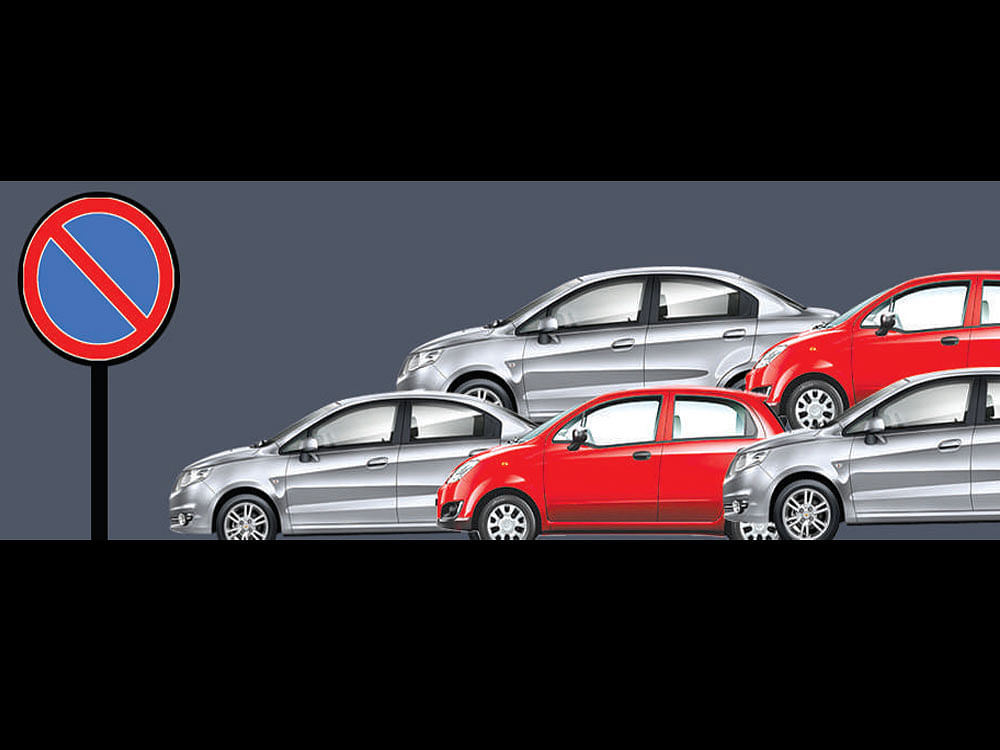
Maximise every inch of commercial space. Say goodbye to building bye-laws. Making a mockery of existing laws, shops have occupied basements across the city, shifting parking spaces to the road. Can a city with its roads traffic-clogged beyond redemption afford this deed by design?
In Jayanagar, Gandhinagar, Koramangala or Indiranagar, the violations are damningly out in the open. Yet, the civic agencies turn a blind eye. Does that indicate a nexus, a well-oiled machinery that involves builders, business interests, corporators and the bureaucracy?
As motorists spend hours trapped in traffic chaos, the parked vehicles remain the source of many such congestions. If the Namma Metro pillars have eaten up a big chunk of the road width, these illegal parking slots have made it even tougher to get past those streets.
Violation by design
Typically, buildings designed as commercial complexes do provide a basement free of any structures. But once the necessary approvals are obtained, the shops emerge later, blocking the entire approach to the underground. The shop-owners and customers park their vehicles right on the road. Those slots then get regularised, apparently by greasing the official palm.
On CMH Road in Indiranagar, this strategy is there for all to see. Restaurants, mobile sale and repair shops and even big brand showrooms operate from the basements here. Footpaths have become their default store extensions and a big chunk of the road, their parking lots.
Purely residential spaces have overnight transformed as commercial hubs. Here, the original design would allow space for one or two cars and a few two-wheelers in the basement. In the process of commercialisation that amplifies the vehicular turnout, the underground design is left untouched. Result: Two cars in, 200 cars parked outside, haphazardly, breaking every traffic rule!
Pay-and-park system
After years, the Bruhat Bengaluru Mahanagara Palike (BBMP) recently decided to reintroduce the ‘pay and park’ system. This would mean vehicles can be parked on the roadside in designated zones. In other words, cars left outside due to lack of basement space, can legally remain there but for a price. The Palike’s rationale, articulated by its top officials, is clear: Its revenues will get a boost.
Eighty-seven parking places have been identified to implement the 'pay and park' system. BBMP has estimated about 7,500 vehicles can be accommodated here. Equipped with sensors and meters, the parking zones will generate bills automatically. Also on the Palike's agenda is a mobile application that will identify available spaces in a specific parking lot.
Legitimising slots
But is legitimising parking on the roadsides the only way or right way out? The traffic police topbrass has already voiced his concerns, fearing that more parking lots would only reduce the motorable width of the roads. Besides, the move would only incentivise private personal transport.
The solution could be building more multi-storeyed parking lots. But, as civic evangelist V Ravichandar points out, such structures built by BBMP are in bad shape. The construction is shoddy and the upkeep worse. The fate of a new one coming up at Freedom Park may not be different.
Where does that leave Bengaluru's harried commuters? One option could be to outsource such parking lots to private players. The hefty fees they would levy to compensate for the high land prices might just dissuade vehicle-owners from taking their cars into busy inner city areas.
Another option, says Ravichandar, would be to introduce a residential parking permit system, where the parking lot is owned by a house owner. A concept now in vogue in many cities of the developed world, this would allow more parking slots but at a price. “The concept of free parking is just not on.”
No penal action
But these alternatives would still let the basement rule violators go scot-free. The bye-laws under the Karnataka Municipal Corporation Act 1976 would still remain only on paper. Confronted with tell-tale proof of blatant violations of the rules, the Palike officials had last month promised to cancel the trade licenses of the basement shop-owners.
However, powerful linkages between the commercial interests and the Palike machinery have ensured that no such move gets into action mode. As hundreds of Metro pillars are being readied to take up huge swathes of road space in the near future, the basement encroachments are bound to spark some serious traffic gridlocks on the road. The worried traffic police have fired the first warning shots. Is anyone
listening?
Also Read: Taxing search for parking on congested lanes
Also Read: 3 More Parking lots CBD